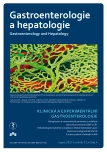Remsima® – the first biosimilar infliximab CT-P13
Authors:
M. Lukáš
Authors‘ workplace:
Klinické a výzkumné centrum pro idiopatické střevní záněty ISCARE I. V. F. a. s., Praha
Published in:
Gastroent Hepatol 2017; 71(4): 363-364
Category:
Drug Profile
doi:
https://doi.org/10.14735/amcsnn2017363
Sources
1. Urbánek K. První biosimilární monoklonální protilátka – infliximab. Klin Farmakol Farm 2014; 28 (1): 19–22.
2. Lukáš M, Kolář M. Biosimilární léčiva u idiopatických střevních zánětů. In: Tesař V (ed.). Biosimilars. Praha: Mladá Fronta 2017. In press.
3. Kolar M, Duricova D, Bortlik M et al. Infliximab bosimilar (Remsima™) in therapy of inflammatory bowel diseases patients: experience from one tertiary inflammatory bowel diseases centre. Dig Dis 2017; 35 (1–2): 91–100. doi: 10.1159/000453343.
4. Higgins PD. Comment on article Biosimilar infliximab in anti-TNF naïve IBD patients – 1-year clinical follow up. Gastroent Hepatol 2017; 71 (4) : 323–324. doi: 10.14735/amgh2017323.
Labels
Paediatric gastroenterology Gastroenterology and hepatology SurgeryArticle was published in
Gastroenterology and Hepatology

2017 Issue 4
- Metamizole at a Glance and in Practice – Effective Non-Opioid Analgesic for All Ages
- Metamizole vs. Tramadol in Postoperative Analgesia
- Obstacle Called Vasospasm: Which Solution Is Most Effective in Microsurgery and How to Pharmacologically Assist It?
- The Importance of Limosilactobacillus reuteri in Administration to Diabetics with Gingivitis
-
All articles in this issue
- Clinical and experimental gastroenterology
- Effect of nitroglycerin on high resolution manometry parameters in patients with achalasia
- Graft-duodenal fistula – a cause of massive gastrointestinal bleeding
- Potential use of non-invasive methods for non-alcoholic fatty liver disease
- Adenocarcinoma of the small intestine as an unusual cause of hypochromic anemia
- Acute appendicitis – a rare complication of colonoscopy
- Epidemiological study of obesity in populations of different racial, cultural, economic and dietary backgrounds
- 35th Slovak and Czech Gastroenterological Congress and 39th Slovak and Czech Endoscopic Days
-
Komentář k lékovému profilu
Rifaximin – terapeutické vlastnosti - The selection from international journals
- Remsima® – the first biosimilar infliximab CT-P13
- Serum concentration of S100P protein in patients with colorectal cancer
- Self-expandable coated metal Danis stent as a bridge to liver transplantation
- Outcome of treatment of Helicobacter pylori infection based on microbiological susceptibility testing following the unsuccessful second-line eradication treatment
- Current position of eHealth care in the management of IBD patients
-
Comment on article
Biosimilar infliximab in anti-TNF naïve IBD patients – 1-year clinical follow-up -
Endoscopic achievements in the upper gastrointestinal tract and small bowel
Christian Ell Lecture – Gastro Update Europe 2017, Vienna
- Gastroenterology and Hepatology
- Journal archive
- Current issue
- About the journal
Most read in this issue
- Outcome of treatment of Helicobacter pylori infection based on microbiological susceptibility testing following the unsuccessful second-line eradication treatment
- Self-expandable coated metal Danis stent as a bridge to liver transplantation
- Acute appendicitis – a rare complication of colonoscopy
- Graft-duodenal fistula – a cause of massive gastrointestinal bleeding
